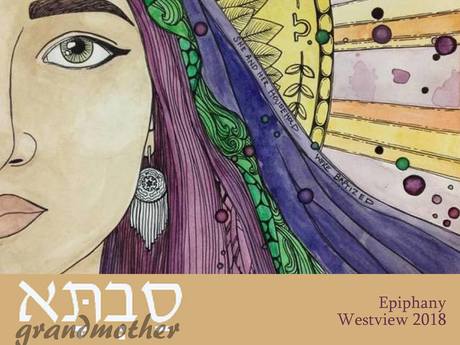Part 2: Mother Mary Revolutionary - By Rosilee Sherwood
Part 3: We are Saved by the Work of Christ’s Grandmothers - By Caleb Ratzlaff
We can easily remove ourselves from the gravity of this injustice by thinking about how things were different in such a foreign place, such a long time ago. But try to connect emotionally to the fact that Mary was considered worthy of death because she was pregnant outside of marriage. This is unfair, abusive, and outrageous. Perhaps you have faced death, or know someone who has. While we don’t know them, Mary had a family, and even a fiance who would have been expected to accept her death as a natural consequence of her pregnancy. Joseph was not prepared to accept this and appeared to have some sense that the system he was a part of was flawed. He decided to divorce Mary quietly without having her stoned. For Joseph, to let Mary live was an act of rebellion, resistance, and revolution. He then takes this act further when he decides to marry her anyway. For Mary and her child to simply live was an act of revolt.
Having been labeled an “outsider” because of her pregnancy, Mary had been pushed out of her community and deemed worthless. To live and raise her child was a risk and a challenge to the abusive power systems that permeated her world. When we consider Mary’s magnificat we see that she is not unaware of the way her pregnancy challenges the accepted systems of the day. In Luke 1:46-55 Mary says,
My soul magnifies the Lord
And my spirit rejoices in God my Savior;
Because He has regarded the lowliness of His handmaid;
For behold, henceforth all generations shall call me blessed;
...He has shown might with His arm,
He has scattered the proud in the conceit of their heart.
He has put down the mighty from their thrones,
and has exalted the lowly.
He has filled the hungry with good things,
and the rich He has sent away empty.
As a familiar passage sung in the concert halls of the rich and powerful, we can easily domesticate Mary’s outrageous declarations. We may think, God has seen how lowly, pathetic and unworthy Mary is, and blessed her anyway! But what if she is saying God has seen how she has been made low, oppressed and beaten down? “From now on I will be called blessed”, she says, “rather than outsider”. It is the proud, the mighty, and the rich who have constructed the systems of oppression that leave some with respect and others with shame. Mary takes her pregnancy as a sign of blessing and validation. She reveals herself as worthy, making herself an agent in God’s mission to see her oppressors scattered and humbled. Mary’s life serves as a declaration to those who have always filled their own bellies and left others hungry: give up your thrones, your positions of power, and privilege! Tear down the wall that keeps the “outsiders” out! This is not the prayer of a simple country girl complying with the wishes of the hierarchy that surrounds her. This is a revolutionary ready to take on the system that wants her dead.
How does Mary carry out this mission? First, she revolts by simply living. Mary is not killed, even though she is pregnant. She lives and gives birth. These common acts, carried out by women throughout the world and throughout time, act as a sign of resilience and even defiance. For Mary, and for many who are oppressed, to live, to wake up each morning, is to resist the forces that seek to extinguish the spark of hope. To give birth is to fan that spark into a flame.
Second, Mary believes that her son Jesus is going to lead the revolution she seeks. Her devotion to raising him is an enormous statement of faith, courage, strength, and determination. She is working, as a mother, to fight the system that leaves the poor to die and the hungry to starve. It’s not that Mary is a revolutionary and then goes home to be a mom. For Mary, the very act of mothering is her act of revolution.
Growing up, I often heard Biblical stories as narratives of God’s choice to overlook the barriers that divide “outsiders” from “insiders”. I grew up with a more conventional rendition of Mary’s story, where God was the active agent of revolution. Despite her outsider status, I was told, God plucks Mary out of the mire and choses to use her. God gives the unfortunate “outsider” what they do not deserve and lifts them over the dividing wall, bringing them into God’s fold, the community of believers.
Mary’s resilience and acts of resistance in life and motherhood force me to tell this story differently. In this telling, Mary and God are partners who reject the division of “insiders” and “outsiders” altogether. Rather than lifting one lucky soul over the wall, they break through the wall and prove that the system that kept Mary out was broken and unjust.
When we work towards including people who have been labelled “outsiders” we challenge the systems that keep those people homeless, worthless and oppressed. But it is they who are doing the real work. Like in Mary’s time, we live in a culture with rules and ways of doing things that serve a few while leaving many to starve, both in body and mind. It is not our job to be a “hero” and pick a lucky few up out of the “outsider” group and bring them, the chosen ones, over to be “insiders” with us. No, just as we see God partnering with Mary, it is our job to partner with the oppressed and smash down the wall that keeps “outsiders” out. We are called to question the habits and patterns of abuse that benefit a few and deprive many. This is an enormous challenge and very hard work for everyone involved, but let’s be clear: it is those who have been labelled “outsiders” who are doing the hardest work. When one is stereotyped, stigmatized and told that she is not worthy, one generation after another, it is an act of courage, bravery and determination to tear off these labels. For the oppressed, as it was for Mary, it is an act of daily resistance to be a mother, to give birth, and sometimes to do nothing more than to continue living.


 RSS Feed
RSS Feed

